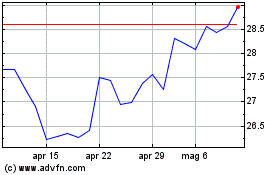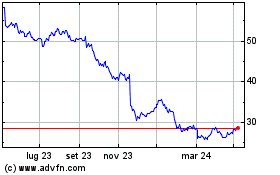By Ruth Bender
In April last year, Bayer AG Chief Executive Werner Baumann was
on defense. The architect of one of the most disastrous
acquisitions in German corporate history, he had become the
country's first chief executive to lose a vote of confidence by
shareholders.
Almost a year later, with the German chemicals and
pharmaceuticals company closer to settling more than 42,000
lawsuits inherited from its acquisition of U.S. agriculture giant
Monsanto Co., and with a group-wide restructuring under way,
investors say Mr. Baumann might just manage to fix the mess he
made.
Bayer and plaintiff lawyers are approaching a deal in which
Bayer would pay a total of roughly $10 billion for current and
future plaintiffs who allege the company's Roundup herbicide causes
cancer, according to people familiar with the negotiations. Many
analysts say a settlement in that range would be positive for
Bayer.
Bayer declined to comment on the amount or time frame for a
settlement. The company argues that Roundup is safe when used as
instructed and has appealed the first three verdicts.
Expectations that the company could soon find a reasonable way
out of its legal morass have helped pull Bayer's shares up roughly
50% since they hit a seven-year low of roughly EUR52 last June.
But even Mr. Baumann's supporters say his window for fixing
Bayer might not stay open much longer. On April 28, the company
holds its next regularly scheduled shareholder meeting and many
investors expect Bayer to share at least a partial solution or
progress on how to resolve the legal battle before then.
Absent any progress, Mr. Baumann could face another
no-confidence vote, with another no being harder to survive,
investors say.
Mr. Baumann's $63 billion Monsanto acquisition in June 2018,
which he had been working on since well before becoming CEO that
same year, backfired after Bayer lost the first Roundup cases
before California juries, raising alarm in the market about
liabilities the company could face. Last spring, with Bayer's
market capitalization down more than a third since the first trial
loss, investors rejected a vote of confidence in the executive
board, a postwar first for a Dax-listed company.
Strong support from the company's nonexecutive directors helped
Mr. Baumann survive the vote. But investors also say he heard their
message.
The company last June boosted oversight of its legal defense,
including by creating a special board committee to monitor Roundup
lawsuits and naming a lawyer with expertise in mass torts to advise
the board. In October, it added an agriculture expert to its board.
All those measures were demanded by investors, including activist
investor Elliott Management Corp.
Another U-turn was Mr. Baumann's agreement to engage in
settlement talks with Roundup plaintiffs after he had previously
insisted that Bayer was willing to fight a yearslong court
battle.
Ingo Speich, head of sustainability and corporate governance at
Bayer investor Deka Investment, said the CEO also addressed
operational concerns by selling Bayer's animal health unit and
consumer-care brands on time and at good prices.
"Is he responsible for the legal issues? Yes. But he also showed
that he can keep the business together," said Mr. Speich, nine
months after blaming Mr. Baumann for "infecting a healthy Bayer
with the Monsanto virus."
Within Bayer, employees say, Mr. Baumann has also worked to
restore confidence and team spirit following what some describe as
a meltdown in morale a year ago. Last spring, he held video town
halls to reassure staff each time the company faced a new legal
setback in the U.S., according to one midlevel executive.
"Last year people talked about the lawsuits all the time, now
it's mostly business as usual," the person said. A lull in trials
has helped, according to people familiar with the company: Bayer
and plaintiff lawyers have agreed to postpone dozens of cases since
they started settlement talks last fall.
Among the company's many deeply anchored traditions is its
ownership of Bundesliga soccer club Bayer 04 Leverkusen, whose home
matches are must-attend occasions for top executives. At a recent
soccer match with fellow senior managers, Mr. Baumann seemed
optimistic about the future of the company and how it is growing,
according to a person present at the meeting.
"There is a feeling there is light at the end of the tunnel,"
the person said.
Mr. Baumann, the son of a baker, spent over 30 years working his
way up from Bayer's finance department to CEO. People who know him
say he is cerebral, detail-oriented and rational. The CEO often
brings a small notebook to meetings where he writes down questions
he needs to follow up on, according to people who have worked with
him. Others say he can summon minute details, such as the number of
participants in a continuing clinical drugs trial, off the top of
his head.
With the exception of Mr. Baumann's predecessor, the
Dutch-American Marijn Dekkers, Bayer CEOs have always been Bayer
lifers. Many, like Mr.Baumann and current Chairman Werner Wenning,
even hail from the Rhineland region, where Bayer is based.
Several of the group's top leaders, Messrs. Baumann and Wenning
included, lived through a similar crisis at Bayer in the early
2000s, when the company faced thousands of U.S. lawsuits over its
cholesterol-lowering drug Baycol. Bayer had to pull the drug after
it was linked to serious injuries and even death, and the company's
share price fell to an all-time low of EUR10.
During his time as CEO, Mr. Wenning improved Bayer's position by
spinning off assets, cutting jobs and eventually settling the
claims for much less than investors had feared.
When Bayer set out to grow again, Mr. Baumann, described by many
as Mr. Wenning's protégé, proved himself a talented number cruncher
during the integration of German pharmaceuticals company Schering
AG, according to people present at the time.
The fact that Mr. Wenning did pull Bayer out of trouble made him
something of a legend within the company. People familiar with
Bayer said Mr. Baumann would need to deliver much more than a
settlement to achieve a similar status.
Besides striking a settlement at the low end of expectations,
investors say the CEO still needs to demonstrate how Monsanto will
make Bayer thrive.
The lawsuits aside, Roundup is facing competition from a
determined rival. Seed and pesticide maker Corteva Inc., is making
moves to woo farmers away from Bayer products.
For Deka's Mr. Speich, a full judgment on the Monsanto purchase
-- and thus on Mr. Baumann -- will only be possible some two years
from now, once the agriculture business is fully integrated.
Mr. Baumann has said repeatedly that buying Monsanto was the
right move, saying it will position Bayer as leader in a market
with enormous growth potential given the world's fast-growing
population.
Meanwhile, once the legal fight is resolved, some analysts say
investors could push Bayer to consider the merits of splitting its
pharmaceuticals and crop-science businesses. People familiar with
Bayer's thinking said the company would likely fight any push for a
split, arguing that its existing plan to boost sales and profit
through 2022 will create more value for shareholders.
"A settlement would of course be positive but I think it will
grant Mr. Baumann only a short respite," said Markus Mayer, analyst
from Baader Bank.
-- Ben Dummett in London, Laura Kusisto in New York and Jacob
Bunge in Chicago contributed to this article.
Write to Ruth Bender at Ruth.Bender@wsj.com
(END) Dow Jones Newswires
February 10, 2020 06:18 ET (11:18 GMT)
Copyright (c) 2020 Dow Jones & Company, Inc.
Grafico Azioni Bayer (TG:BAYN)
Storico
Da Mar 2024 a Apr 2024

Grafico Azioni Bayer (TG:BAYN)
Storico
Da Apr 2023 a Apr 2024
